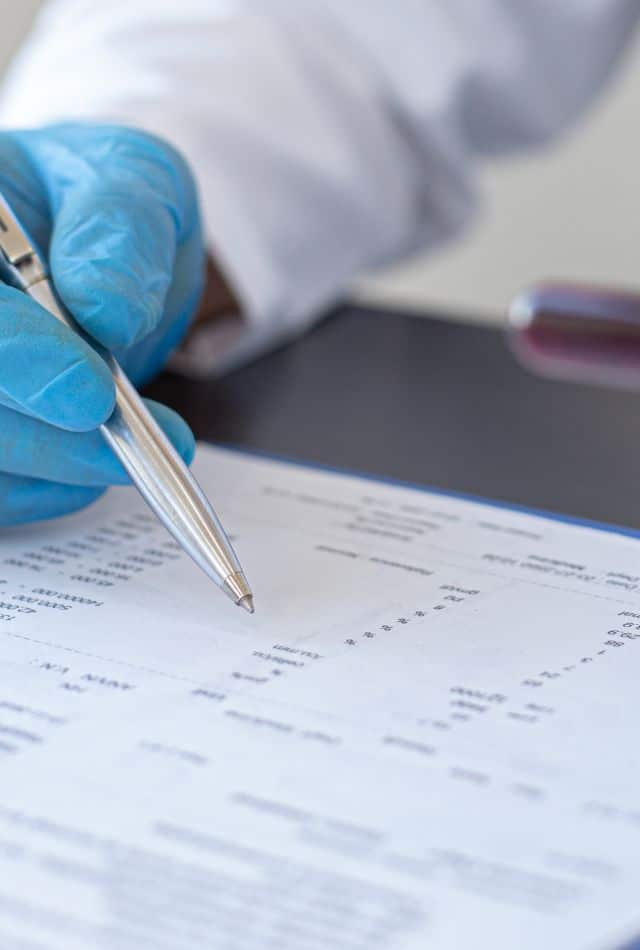NCLEX Lab Values – Overview
To make a clinical decision, a nurse must know different lab values. It is an important step to draw any interpretation in a clinical setting. Other laboratories and diagnostic tests offer invaluable information and insights about the patient that can help to monitor the illness and confirm the diagnosis.
Some NCLEX questions can ask you for laboratory results without the typical lab levels. The NCLEX can not give you any values within the normal range. You need to identify if it is within the normal range or not.
NECLEX Lab Values
The NCLEX exam can be organized into four different categories and subcategories according to the client’s needs.
- Safe and effective care environment
- Psychological integrity
- Health promotion and maintenance
- Physiological integrity

A safe and effective care environment can be categorized into safety and infection control and management of care.
Physiological integrity can be categorized into-
- Physiological adaptation
- Reduction of risk potential
- Basic care and comfort
- Pharmacological and parenteral therapies
The Reduction of the risk potential subcategory contains questions for test takers. This subcategory can evaluate the possibility of reducing patients’ risk of developing health problems. However, it also requires diagnostic results and monitoring.
According to the NCLEX examination guide, test takers must be able to identify lab values of-
- Blood urea nitrogen (BUN)
- Arterial blood gases (ABG) like HCO3, PCO2, pH, PO2, and SaO2
- Hemoglobin
- Glucose
- Cholesterol
- Creatinine
- Hematocrit
- Glycosylated hemoglobin (HgbA1C)
- Platelets
- INR
- Potassium
- PTT, PT, and APTT
- WBC
NCLEX Lab Values Review
In this section, we will discuss different lab values in detail.
Complete Blood Count
A complete blood count test, or CBC, can help healthcare professionals diagnose, screen, and monitor several conditions, disorders, diseases, and infections.
Normal measurements for the most common CBC NCLEX laboratory values-
- Hemoglobin in men: 13.0- 17.0 g/DL
- Hemoglobin in women: 11.5-15.5 g/DL
- Hematocrit in men: 40%-55%
- Hematocrit in Women: 36%-48%
- WBC: 5,000-10,000/NL
- Platelets: 150,000-400,000/μL
Arterial Blood Gasses
An arterial blood gas test can allow healthcare professionals to measure the blood’s carbon dioxide and oxygen levels.
This provides information about conditions that affect the circulatory system, respiratory system, and metabolic processes.
- pO2: 75-100 mmHg
- pH: 7.35-7.45
- O2 Saturation: 95-100%
- HCO3: 22-26 mEq/L
- PaCO2: 35-45 mmHg
Comprehensive Metabolic Panel
It allows healthcare professionals to evaluate a patient’s liver, kidneys, protein levels, blood sugar levels, electrolyte levels, and calcium levels.
- Potassium: 3.7-5.2 mEq/L
- Glucose (fasting): 70-110 mg/DL
- Sodium: 135-145 mEq/L
- BUN: 5-20 mg/dL
- Serum Creatinine: 0.6-1.2 mg/DL
Different liver Function Tests (LFTs) are:
- ALP: 40-129 u/L
- ALT: 7-56 u/L
- AST: 8-48 u/L
Lipid Panel
Lipid profile tests or a lipid panel can examine the amount of cholesterol and fat in your body. Healthcare professionals can monitor a patient’s risk of developing cardiovascular disease.
- HDL: Over 40 mg/DL
- LDL Optimal: Less than 100 mg/DL
- LDL Near Optimal: 100-129 mg/DL
- LDL Borderline High: 130-159 mg/DL
- LDL High: 160-189 mg/DL
- LDL Very High: 190 mg/DL and higher
- Triglycerides (TGs) Normal: Less than 150 mg/DL
- Triglycerides (TGs) Borderline High: 150-199 mg/DL
- Triglycerides (TGs) High: 200-499 mg/DL
- Triglycerides (TGs) Very High: 500 mg/DL and higher
- Total Cholesterol: Less than 200 mg/dL
Hemoglobin A1C
The hemoglobin A1C test can measure blood sugar levels over the past three months. This can allow healthcare professionals to diagnose type 1 and type 2 diabetes.
- Normal: Below 5.7%
- Prediabetes: 5.7%-6.4%
- Diabetes: 6.5% and higher
Coagulation Levels
Coagulation tests can measure your blood clotting ability and how long it may take to clot your blood. In addition, these tests can help healthcare professionals get information about thrombosis risks and bleeding.
- INR Not on Warfarin: 0.8-1.1
- INR On Warfarin: 2.0-3.0 seconds
- aPTT: 30-40 seconds
- PT: 10-13 seconds
- PTT: 25-35 seconds
Thyroid Levels
Thyroid test results can be used to measure the functioning of the thyroid gland. Your body’s thyroid level helps diagnose hypothyroidism, hyperthyroidism, and other associated conditions. It can also help to monitor and adjust synthetic thyroid hormone prescriptions.
- Thyroid-stimulating Hormone (TSH): 0.40-4.50 mIU/ml
- T4 (Total Thyroxine): 5.0-12.0 μg/dL
- FT4 (Free T4): 0.9-1.7 ng/dL
- T3 (Total Triiodothyronine): 80-180 ng/dL
- FT3 (Free T3): 2.0-4.4 pg/mL
Therapeutic Drug Levels
The therapeutic drug level helps healthcare professionals monitor and track drug overdoses and underdoses.
- Digoxin: 0.8-2.0 ng/ml
- Lidocaine: 1.5-5.0 μg/mL
- Lithium: 0.8-1.2 mEq/L
- Phenobarbital: 10-30 mcg/ml
- Phenytoin: 10-20 mcg/ml
- Theophylline: 10-20 mcg/ml
Cardiac Biomarkers
When the heart experiences damage or stress from low oxygen levels, it releases cardiac enzymes into the bloodstream.
Nurses and healthcare providers can use measurements of cardiac biomarkers to screen for heart damage, diagnose heart conditions, and monitor patient health while on heart medication or following surgery.
- Troponin I: 0-0.04 ng/ml
- Troponin T: 0-0.01 ng/ml
- Myoglobin in Men: Less than 91 ng/ml
- Myoglobin in Women: Less than 63 ng/ml
- Normal Creatine Kinase or CK levels vary according to sex, race, activity level, and the lab’s chosen test method.
Conclusion
These NCLEX lab values can help healthcare professionals understand several body conditions and find solutions. It appears to be a challenging process for some experts. However, it can improve with practice and effort with time.
See Also
Respiratory Alkalosis Lab Values